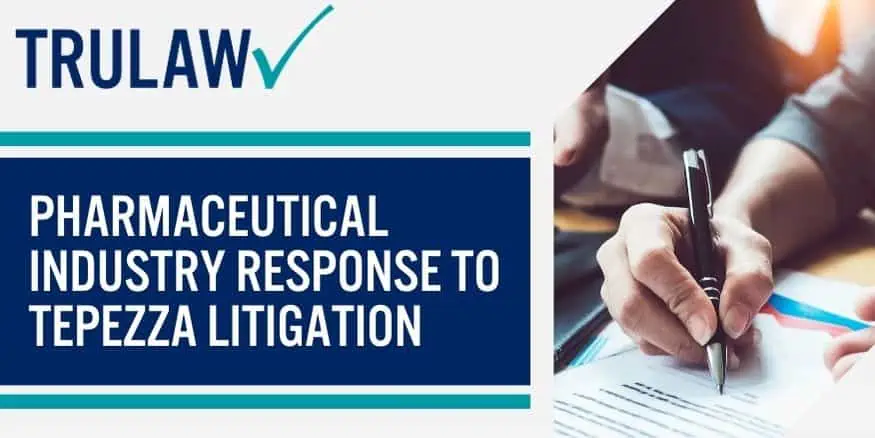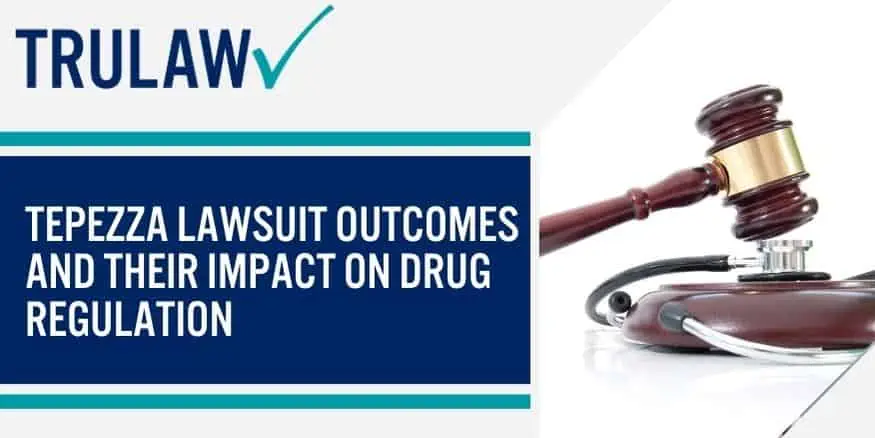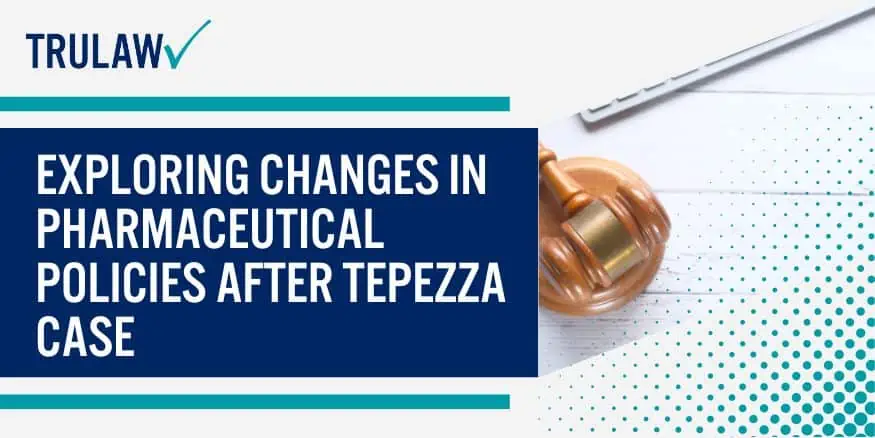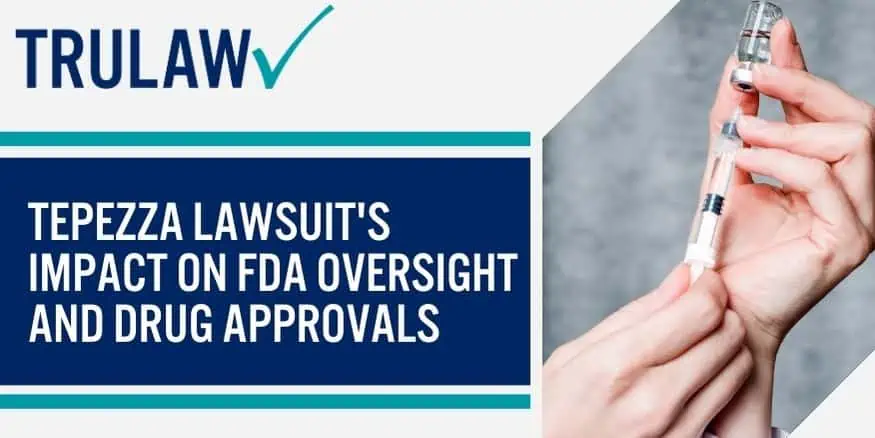Tepezza Lawsuit: The Impact on Pharmaceutical Industry Regulations
- Last Updated: June 12th, 2025

Attorney Jessica Paluch-Hoerman, founder of TruLaw, has over 28 years of experience as a personal injury and mass tort attorney, and previously worked as an international tax attorney at Deloitte. Jessie collaborates with attorneys nationwide — enabling her to share reliable, up-to-date legal information with our readers.
Legally Reviewed
This article has been written and reviewed for legal accuracy and clarity by the team of writers and legal experts at TruLaw and is as accurate as possible. This content should not be taken as legal advice from an attorney. If you would like to learn more about our owner and experienced injury lawyer, Jessie Paluch, you can do so here.
Fact-Checked
TruLaw does everything possible to make sure the information in this article is up to date and accurate. If you need specific legal advice about your case, contact us by using the chat on the bottom of this page. This article should not be taken as advice from an attorney.
Key takeaways:
- The Tepezza lawsuit prompted tighter regulatory compliance and process adjustments in the pharmaceutical industry.
- The lawsuit prompted a focus on thorough safety assessment for products like Tepezza during trials and development.
- Facing Tepezza lawsuit intricacies, pharmaceutical companies collaborate with legal experts to ensure compliance with norms for Tepezza and similar hearing-related drugs.
Tepezza Lawsuit: The Impact on Pharmaceutical Industry Regulations
The pharmaceutical industry is facing increased scrutiny for drug pricing, marketing practices, and adverse reactions.
One concern is Tepezza lawsuit, including multidistrict litigation, which have gained traction among plaintiffs and lawyers representing injured individuals.
Product liability lawsuits occur when plaintiffs seek compensation for injuries from defective products.
Multidistrict litigation consolidates similar cases for more efficient handling and faster settlements.
This process allows each plaintiff to have proper legal representation. It also offers the potential for punitive damages.
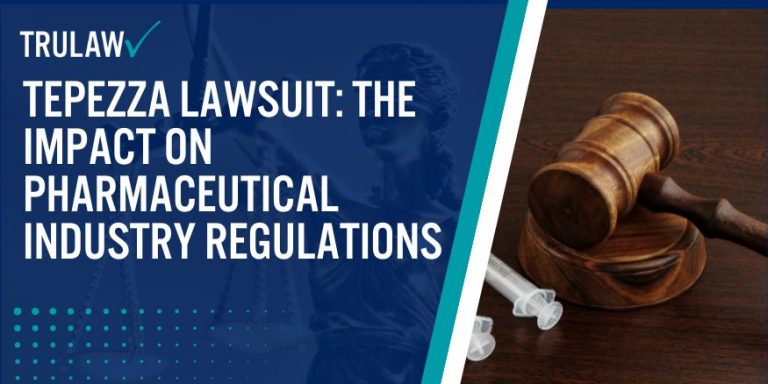
There is also a greater focus on patient safety and adverse event reporting in the pharmaceutical industry.
Prompt reporting of adverse events is crucial for patient well-being and regulatory compliance.
As Tepezza lawsuit and settlement cases continue to evolve, it is important to consider their implications on consumers and pharmaceutical companies.
Studying key cases in the pharmaceutical industry can provide insights into the impact of product liability lawsuits.
Staying informed about multidistrict litigation and developments will help us understand this evolving field.
Table of Contents
Tepezza Drug Safety and Regulatory Implications Post-Lawsuit
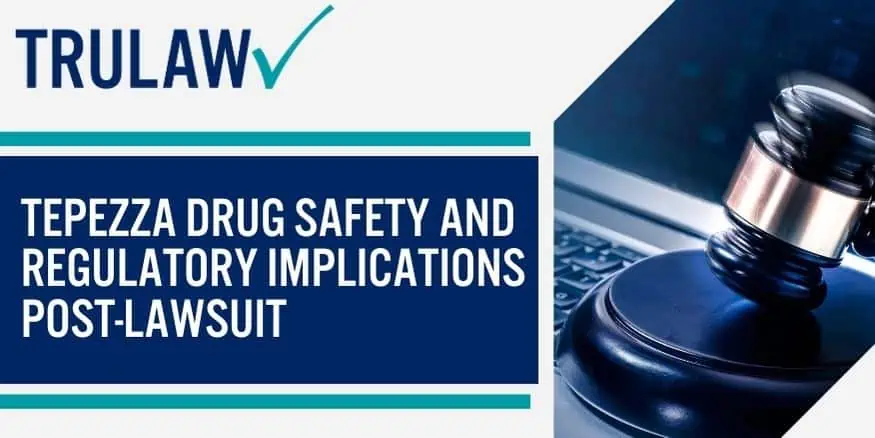
Tepezza, a treatment for thyroid eye disease, is under scrutiny due to dangerous drug lawsuits.
These cases have raised concerns about potential side effects, including tinnitus.
Regulatory authorities are reevaluating the safety of teprotumumab and considering measures to protect Tepezza patients from side effects.
One implication of the Tepezza lawsuit is the need for additional monitoring of teprotumumab treatment.
This includes regular infusions to track any adverse reactions or side effects, such as hearing damage.
Monitoring patients receiving Tepezza infusions is crucial to promptly identify and treat thyroid eye disease and hearing damage cases.
The lawsuit may also lead to changes in labeling and warnings for teprotumumab treatment.
With thyroid eye disease drugs and hearing problems, it could be based on filing a Tepezza lawsuit for possible permanent hearing loss or tinnitus.
Authorities may require manufacturers to provide clearer information about possible side effects, including hearing loss.
This empowers patients to make informed decisions about their healthcare and recognize warning signs of permanent hearing damage.
Post-lawsuit safety assessments focus on investigating reported adverse events, including hearing loss.
Healthcare providers play a vital role in gathering comprehensive data on Tepezza hearing loss lawsuits.
This information helps improve patient care and aids regulatory evaluations.
Regulatory bodies must balance patient safety with access to medications like Tepezza.
While addressing concerns raised by lawsuits is crucial, access should not be hindered for those who genuinely benefit from Tepezza for thyroid eye disease and hearing loss.
Tepezza Legal Case Effects on Pharmaceutical Compliance
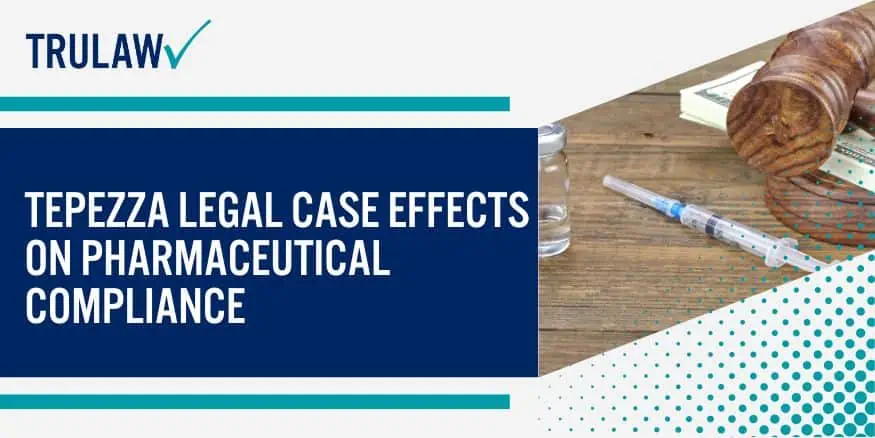
The recent legal case involving Tepezza has brought about significant changes in the pharmaceutical industry, particularly in terms of compliance with regulatory standards for hearing loss.
This article explores the effects of the Tepezza lawsuit on pharmaceutical compliance and highlights key areas that have witnessed strengthened emphasis and enhanced monitoring, particularly in relation to hearing loss.
Strengthened emphasis on adherence to FDA guidelines during clinical trials
The Tepezza legal case has emphasized the need for following FDA guidelines in clinical trials, specifically regarding hearing loss.
The lawsuit revealed instances where proper protocols were not followed, resulting in serious consequences for Tepezza patients.
To avoid potential lawsuits and protect patient safety, pharmaceutical companies are now prioritizing strict compliance with these guidelines, especially for medications like Tepezza that have been linked to hearing loss.
Companies are intensifying measures, like using Tepezza, in clinical trials to assess drug safety and efficacy for hearing loss, ensuring FDA compliance:
- Conducting thorough training sessions for research personnel involved in clinical trials is crucial for ensuring the accurate and efficient evaluation of hearing loss and the effectiveness of Tepezza.
- Implementing robust documentation processes to track adherence to protocols.
- Regularly reviewing trial procedures to identify any deviations from regulatory requirements, including those related to hearing loss.
Enhanced monitoring of potential side effects and adverse events during drug development stages
Another significant impact of the Tepezza lawsuits heightened attention given to monitoring potential side effects and adverse events during drug development stages, including those related to hearing loss.
In this regard, pharmaceutical companies are taking proactive steps to identify and address any hearing loss and Tepezza issues promptly.
Tepezza infusions have been associated with certain side effects, including tinnitus and hearing loss.
The legal case shed light on instances where hearing loss and Tepezza side effects were not adequately monitored or reported.
To prevent hearing loss and similar situations from arising in the future, companies are now implementing measures such as using Tepezza.
These are some ways that the companies are implementing the measures:
- Establishing comprehensive reporting systems for adverse events experienced by trial participants, including hearing loss and Tepezza.
- Conducting regular safety reviews throughout all stages of drug development is crucial to identify and address any potential risks or concerns related to hearing loss.
- Collaborating closely with healthcare professionals and patients to gather real-time feedback on potential side effects of Tepezza and its impact on hearing loss.
Increased penalties for non-compliance with regulatory standards
The Tepezza legal case has also led to an increase in penalties for non-compliance with regulatory standards related to hearing loss.
Pharmaceutical companies now face more severe consequences if they fail to adhere to established guidelines and protocols regarding hearing loss and Tepezza.
These penalties serve as a deterrent, encouraging companies to prioritize compliance and ensure patient safety, especially when it comes to medications like Tepezza.
It is important for companies to be aware of the potential side effects, such as hearing loss, and take necessary precautions.
The increased penalties include:
1. Financial fines: Companies found guilty of non-compliance may face substantial monetary fines, impacting their financial stability.
This can be especially detrimental to companies that are already dealing with hearing loss.
2. Legal repercussions: Non-compliant pharmaceutical companies may face lawsuits from affected patients with hearing loss, leading to reputational damage and potentially significant settlements.
3. Regulatory restrictions: Authorities may impose limitations on the company’s ability to conduct further clinical trials or market their hearing loss products until compliance is demonstrated.
Understanding the Tepezza Lawsuit's Influence on Drug Industry GuidelinesI
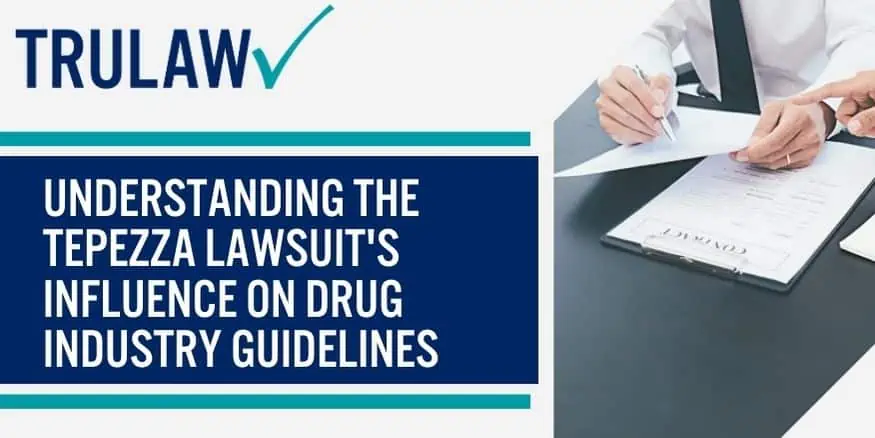
Tepezza Lawsuit Impact on Clinical Trials and FDA Approvals
The Tepezza lawsuit reshaped the hearing drug industry, prompting revisions to trial protocols and FDA approvals.
Robust risk assessment is crucial before market release, especially for hearing and Tepezza.
Enhancing Safety Protocols for New Hearing Drugs
The Tepezza lawsuit reveals gaps in current protocols for hearing medications.
The industry focuses on thorough risk assessment during development, considering Tepezza side effects and long-term safety implications for hearing.
Stricter Guidelines for FDA Approval and Off-Label Use
Pharmaceutical firms adopt stringent FDA approval guidelines post Tepezza lawsuit.
Extensive clinical data is needed for hearing drugs like Tepezza, minimizing risks and off-label use concerns.
Pharmaceutical Industry Response to Tepezza Litigation
Proactive Measures to Address Legal Challenges in Pharmaceuticals
Pharmaceutical Industry’s Response to Tepezza Lawsuit.
Pharmaceutical companies are adopting proactive strategies to manage legal risks related to new drugs, particularly in the context of hearing and Tepezza.
Collaborative Approach with Legal Experts
Collaboration with Legal Experts in Tepezza Cases.
Pharmaceutical firms partner with legal professionals to stay abreast of evolving regulations in the industry, specifically concerning Tepezza.
This collaboration ensures compliance and minimizes legal challenges related to hearing and drug use.
Mitigating Tepezza-Related Risks:
Pharmaceuticals’ Response to the Tepezza Lawsuit approach to the Tepezza lawsuit showcases the significance of stringent testing protocols during clinical trials.
Their meticulous monitoring of Tepezza recipients helps identify and address Tepezza-related safety concerns, mitigating the potential for future litigation.
Internal processes ensure compliance with evolving regulations for products like Tepezza, encompassing research, development, manufacturing, and distribution stages.
Tepezza Lawsuit Outcomes and Their Impact on Drug Regulation
Precedent-setting rulings that shape future litigation involving similar medications
Tepezza lawsuits have the potential to set important legal precedents that will influence future litigation concerning similar medications.
As the first Tepezza hearing loss lawsuit unfolds, its outcome could establish a framework for how other cases are handled in court.
This precedent-setting ruling will not only impact Tepezza cases but also serve as guidance for future pharmaceutical liability lawsuits.
In recent years, there has been an increase in class action lawsuits against pharmaceutical companies due to alleged harmful side effects of certain drugs like Tepezza.
These lawsuits aim to hold Tepezza manufacturers accountable for any damages caused by their products.
The outcome of Tepezza class action lawsuits could determine the level of responsibility pharmaceutical companies have in ensuring the safety and efficacy of their medications.
Potential revision or clarification of existing laws governing pharmaceutical liability cases
The Tepezza lawsuit may result in changes to pharmaceutical liability laws.
Courts often reconsider existing legislation when faced with new legal challenges.
In the case of Tepezza, courts may need to reevaluate laws to address the unique aspects of this medication.
If significant issues arise during the lawsuit, lawmakers may review and modify current drug regulations and liability laws.
One aspect that might be addressed is the standard of care expected from pharmaceutical companies when developing and marketing new drugs.
The results of Tepezza’s hearing loss claims could influence regulations regarding disclosure requirements for drug labels and patient information leaflets.
Influence over insurance coverage policies for drugs involved in lawsuits
Another area where Tepezza lawsuit outcomes can have a substantial impact is insurance coverage policies for drugs involved in litigation.
Insurance providers often base their coverage decisions on factors such as safety records, efficacy data, and legal liabilities associated with specific medications.
If multiple Tepezza settlement amounts are awarded in favor of the plaintiffs, insurers may reassess their coverage policies for this particular drug.
The outcome of the first Tepezza hearing loss lawsuit will likely be closely monitored by insurance companies.
If substantial evidence is presented during the trial linking Tepezza to hearing loss, insurers may revise their coverage criteria.
Potentially exclude or limit coverage for patients seeking treatment with this medication.
Conversely, if the lawsuit results in a favorable outcome for the manufacturer, insurance providers might continue to offer coverage without significant changes.
Exploring Changes in Pharmaceutical Policies after Tepezza Case
Stricter regulations for direct-to-consumer advertising campaigns
The Tepezza lawsuit has prompted the introduction of stricter regulations governing direct-to-consumer (DTC) advertising campaigns by pharmaceutical companies.
In light of concerns raised during the legal proceedings, regulatory bodies have recognized the need to ensure that advertisements for prescription drugs are accurate, fair, and balanced.
These new regulations aim to protect consumers from potentially misleading claims while also promoting transparency within the industry.
Pharmaceutical companies will now face enhanced disclosure requirements when running DTC campaigns.
This means they must provide more comprehensive information about potential risks and side effects associated with their products.
By doing so, patients can make informed decisions about their healthcare and better understand the potential benefits and drawbacks of a particular drug.
Emphasizing transparency through enhanced clinical trial data disclosure
In response to the Tepezza case, there has been a push for greater transparency in disclosing clinical trial data.
Previously, pharmaceutical companies were not always required to disclose negative findings from these trials, which could lead to biased or incomplete information being presented to healthcare professionals and patients.
To address this issue, new policies have been implemented that mandate the disclosure of all clinical trial data, including negative findings.
This ensures that medical professionals have access to a complete picture of a drug’s efficacy and safety profile before making prescribing decisions.
By promoting transparency in this way, patients can have confidence in the medications they are prescribed and trust that their healthcare providers are making informed choices based on comprehensive information.
Evaluating patent laws’ effectiveness in protecting innovative therapies
Another aspect being examined after the Tepezza case is the effectiveness of current patent laws in safeguarding innovative therapies from generic competition.
The lawsuit highlighted concerns regarding patent infringement and whether existing laws adequately protect pharmaceutical companies’ intellectual property rights.
To address these concerns, policymakers are reviewing patent laws with an emphasis on striking a balance between encouraging innovation and ensuring affordable access to medications.
This evaluation aims to protect the rights of pharmaceutical companies that invest significant resources in developing groundbreaking therapies while also considering the importance of generic competition in driving down drug costs.
Tepezza Lawsuit's Impact on FDA Oversight and Drug Approvals
Heightened Scrutiny of the FDA’s Approval Process for New Drugs
The Tepezza lawsuit has brought about a heightened scrutiny of the FDA’s approval process for new drugs.
This legal case has shed light on potential gaps in evaluating drug safety and efficacy before granting approval.
As a result, there is now a growing demand for stricter regulations and more comprehensive testing protocols.
The lawsuit has raised questions about whether the FDA thoroughly evaluates all available data before granting approval to new drugs.
Critics argue that the agency may have been too lenient in its assessment of Tepezza, leading to unforeseen adverse events after its release into the market.
In response to this controversy, there is an urgent need for the FDA to reevaluate its approval process.
This could involve implementing stricter criteria for clinical trials.
Requiring longer follow-up periods to detect potential long-term side effects and conducting more thorough evaluations of preclinical data.
Potential Revision of Post-Market Surveillance Protocols
Another significant impact of the Tepezza lawsuit is the potential revision of post-market surveillance protocols.
These protocols are crucial in detecting adverse events that may not have been apparent during clinical trials due to limited sample sizes or short observation periods.
To enhance post-market surveillance, it is essential to establish more effective mechanisms.
Collecting and analyzing real-world data from patients who have used newly approved drugs like Tepezza drugs.
This can be achieved through increased collaboration between healthcare providers, pharmaceutical companies, and regulatory bodies such as the FDA.
Leveraging emerging technologies like artificial intelligence and machine learning can help identify patterns or signals that indicate potential safety concerns associated with newly approved drugs.
By harnessing these advanced tools, regulators can proactively monitor drug performance in real time and take prompt action if any issues arise.
Increased Collaboration Between FDA and Pharmaceutical Companies
The Tepezza lawsuit has also highlighted the importance of increased collaboration between the FDA and pharmaceutical companies to ensure compliance with safety regulations.
This collaboration can involve regular audits, inspections, and ongoing communication to address any concerns or potential violations.
Pharmaceutical companies have a responsibility to provide accurate and comprehensive data during the drug approval process.
The FDA, on the other hand, must exercise due diligence in thoroughly reviewing this information before granting approval.
By working together closely, both parties can ensure that drugs reaching the market meet rigorous safety standards.
Federal preemption is another aspect that may come into play when considering the impact of the Tepezza lawsuit on FDA oversight and drug approvals.
Federal preemption refers to situations where federal law supersedes state laws or regulations.
Analyzing The Tepezza Case's Role In Shaping Pharmaceutical Legislation
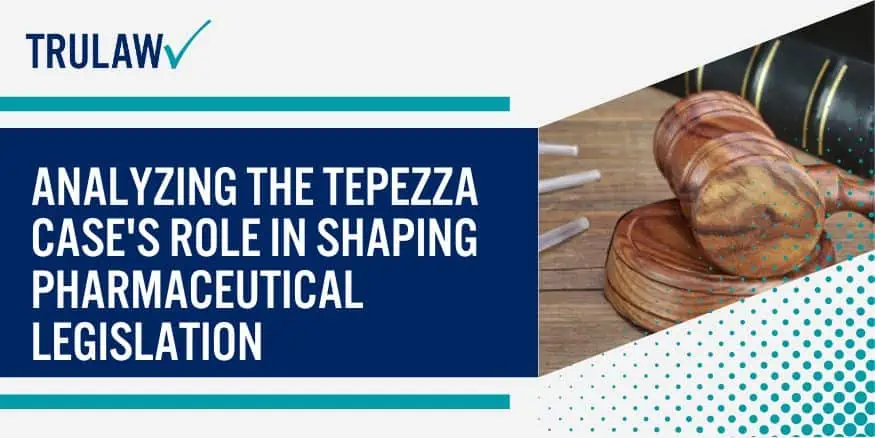
The Tepezza lawsuit has had a significant impact on the development of pharmaceutical legislation.
Prompting a reevaluation of existing laws and the potential introduction of new measures.
This article delves into the key aspects that have shaped this legal landscape.
Curbing Excessive Drug Pricing Practices
One of the main talking points surrounding the Tepezza case is the potential introduction of legislation aimed at curbing excessive drug pricing practices.
The exorbitant cost of medications has long been a concern for patients, and this lawsuit has brought renewed attention to the issue.
Lawmakers are now exploring ways to ensure affordable access to life-saving treatments without compromising innovation or research funding.
Reevaluation of Off-Label Use Promotion and Marketing Restrictions
Another important aspect influenced by the Tepezza hearing loss case is the reevaluation of existing laws regarding off-label use promotion and marketing restrictions.
Off-label use refers to using a medication for a purpose not approved by regulatory authorities.
The lawsuit raised questions about how pharmaceutical companies promote their products for off-label uses.
Leading regulators to examine whether stricter regulations are necessary to protect patient safety while still allowing medical professionals flexibility in prescribing medications.
Strengthening Patient Rights through Enhanced Legal Protections
The Tepezza case highlights the need for stronger legal protections for patients harmed by medications.
Patients can seek legal recourse against manufacturers for damages.
This protects patients and discourages negligence in the pharmaceutical industry.
If you are involved in a Tepezza lawsuit, consult experienced attorneys who specialize in pharmaceutical litigation.
They can guide you through the legal process and navigate complex federal laws.
The Tepezza case also emphasizes the importance of patent protection in the pharmaceutical industry.
Innovators rely on patents to recoup costs and encourage further research.
Balancing affordable access to medications and incentives for research is a key consideration for lawmakers.
Conclusion
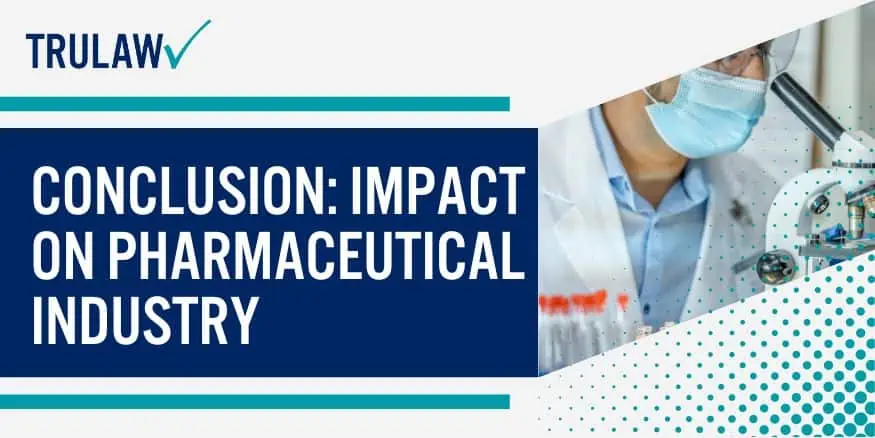
The outcome of the Tepezza lawsuit will likely lead to significant changes in pharmaceutical policies and legislation.
As more information emerges from this case, it is crucial for both consumers and industry professionals to stay informed about these developments.
By understanding the impact of this lawsuit on drug regulation and compliance, we can better navigate the complex landscape of pharmaceuticals and make informed decisions regarding our health.
Tepezza Lawsuit Frequently Asked Questions
-
How Does The Tepezza Lawsuit Affect Patient Safety?
The Tepezza lawsuit has underscored the importance of prioritizing patient safety in the pharmaceutical industry.
It serves as a reminder that stringent safety protocols must be followed throughout a drug’s development, testing, and approval process.
-
Will There Be Any Changes In How Drugs Are Regulated After The Tepezza Case?
Yes, it is likely that there will be changes in drug regulation as a result of the Tepezza case.
The outcome may prompt regulatory bodies like the FDA to enhance their oversight processes and implement stricter guidelines for drug approvals.
-
What Should Consumers Do If They Have Taken Tepezza?
If you have taken Tepezza or are currently using it as part of your treatment plan, it is important to consult with your healthcare provider.
They can provide personalized guidance based on your specific situation.
-
How Can I Stay Updated On Developments Related To The Tepezza Lawsuit?
To stay informed about developments related to the Tepezza lawsuit, you can follow reputable news sources, subscribe to industry newsletters, and regularly check the websites of regulatory bodies like the FDA.
-
Will The Tepezza Lawsuit Impact Future Drug Approvals?
The Tepezza lawsuit may have an impact on future drug approvals by prompting regulatory bodies to review their processes and guidelines.
It is expected that there will be increased scrutiny and stricter requirements for drug manufacturers moving forward.

Managing Attorney & Owner
With over 25 years of legal experience, Jessica Paluch-Hoerman is an Illinois lawyer, a CPA, and a mother of three. She spent the first decade of her career working as an international tax attorney at Deloitte.
In 2009, Jessie co-founded her own law firm with her husband – which has scaled to over 30 employees since its conception.
In 2016, Jessie founded TruLaw, which allows her to collaborate with attorneys and legal experts across the United States on a daily basis. This hypervaluable network of experts is what enables her to share the most reliable, accurate, and up-to-date legal information with our readers!
Additional Tepezza Lawsuit resources on our website:
Here, at TruLaw, we’re committed to helping victims get the justice they deserve.
Alongside our partner law firms, we have successfully collected over $3 Billion in verdicts and settlements on behalf of injured individuals.
Would you like our help?
At TruLaw, we fiercely combat corporations that endanger individuals’ well-being. If you’ve suffered injuries and believe these well-funded entities should be held accountable, we’re here for you.
With TruLaw, you gain access to successful and seasoned lawyers who maximize your chances of success. Our lawyers invest in you—they do not receive a dime until your lawsuit reaches a successful resolution!
AFFF Lawsuit claims are being filed against manufacturers of aqueous film-forming foam (AFFF), commonly used in firefighting.
Claims allege that companies such as 3M, DuPont, and Tyco Fire Products failed to adequately warn users about the potential dangers of AFFF exposure — including increased risks of various cancers and diseases.
Depo Provera Lawsuit claims are being filed by individuals who allege they developed meningioma (a type of brain tumor) after receiving Depo-Provera birth control injections.
A 2024 study found that women using Depo-Provera for at least 1 year are five times more likely to develop meningioma brain tumors compared to those not using the drug.
Suboxone Tooth Decay Lawsuit claims are being filed against Indivior, the manufacturer of Suboxone, a medication used to treat opioid addiction.
Claims allege that Indivior failed to adequately warn users about the potential dangers of severe tooth decay and dental injuries associated with Suboxone’s sublingual film version.
Social Media Harm Lawsuits are being filed against social media companies for allegedly causing mental health issues in children and teens.
Claims allege that companies like Meta, Google, ByteDance, and Snap designed addictive platforms that led to anxiety, depression, and other mental health issues without adequately warning users or parents.
Transvaginal Mesh Lawsuits are being filed against manufacturers of transvaginal mesh products used to treat pelvic organ prolapse (POP) and stress urinary incontinence (SUI).
Claims allege that companies like Ethicon, C.R. Bard, and Boston Scientific failed to adequately warn about potential dangers — including erosion, pain, and infection.
Bair Hugger Warming Blanket Lawsuits involve claims against 3M — alleging their surgical warming blankets caused severe infections and complications (particularly in hip and knee replacement surgeries).
Plaintiffs claim 3M failed to warn about potential risks — despite knowing about increased risk of deep joint infections since 2011.
Baby Formula NEC Lawsuit claims are being filed against manufacturers of cow’s milk-based baby formula products.
Claims allege that companies like Abbott Laboratories (Similac) and Mead Johnson & Company (Enfamil) failed to warn about the increased risk of necrotizing enterocolitis (NEC) in premature infants.
Here, at TruLaw, we’re committed to helping victims get the justice they deserve.
Alongside our partner law firms, we have successfully collected over $3 Billion in verdicts and settlements on behalf of injured individuals.
Would you like our help?
